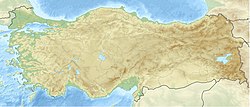| Location | Turkey |
|---|---|
| Region | Malatya Province |
| Coordinates | 38°22′55″N 38°21′40″E / 38.38194°N 38.36111°E |
| Type | Settlement |
| Site notes | |
| Excavation dates | 1932-1939, 1946-1951, 1961-1968 |
| Archaeologists | Louis Delaporte, Claude F.A. Schaeffer, Piero Meriggi, Salvatore M. Puglisi, Alba Palmieri |
| Condition | In ruins |
| Official name | Arslantepe Mound |
| Criteria | Cultural: (iii) |
| Designated | 2021 (44th session) |
| Reference no. | 1622 |
| Area | 4.85 ha (12.0 acres) |
| Buffer zone | 74.07 ha (183.0 acres) |


Arslantepe,[a] also known as Melid, was an ancient city on the Tohma River, a tributary of the upper Euphrates rising in the Taurus Mountains. It has been identified with the modern archaeological site of Arslantepe near Malatya, Turkey.
It was named a UNESCO World Heritage Site under the name Arslantepe Mound on 26 July 2021.[4]
Değirmentepe, a site located 24 km northeast of Melid, is notable as the location of the earliest secure evidence of copper smelting.[5] The site was built on a small natural outcrop in the flood plain about 40m from the Euphrates River.
- ^ "Melid." Reallexikon der Assyriologie. Accessed 12 Dec 2010.
- ^ KBo V 8 IV 18. Op. cit. Puhvel, Jaan. Trends in Linguistics: Hittite Etymological Dictionary: Vol. 6: Words Beginning with M. Walter de Gruyter, 2004. Accessed 12 Dec 2010.
- ^ Hawkins, John D. Corpus of Hieroglyphic Luwian Inscriptions. Vol. 1: Inscriptions of the Iron Age. Walter de Gruyter, 2000.
- ^ "UNESCO adds 6000-year-old 'Lion Hill' in Turkey's Malatya to list". Daily Sabah. 26 July 2021. Retrieved 27 July 2021.
- ^ "TAY-Site Age Details". www.tayproject.org.
Cite error: There are <ref group=lower-alpha> tags or {{efn}} templates on this page, but the references will not show without a {{reflist|group=lower-alpha}} template or {{notelist}} template (see the help page).
